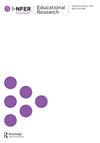STEM中同伴学习辅助模式的体验式学习
IF 2.6
3区 教育学
Q1 EDUCATION & EDUCATIONAL RESEARCH
引用次数: 2
摘要
近年来,高校在科学、技术、工程和数学(STEM)课程中引入了同伴学习助手(PLA)模式。尽管这种替代教学方法在本科教育中具有重要意义,但对解放军实践这种方法的研究,以及对这种模式及其在高等教育中的应用的深刻理解,都是有限的。目的本研究旨在了解解放军在本科STEM班的学习和教学经验。除了之前自己上过STEM课程外,解放军还被要求作为导师上一门教育学课程。方法采用现象学方法进行研究设计,对丰富的访谈数据进行深入分析。对美国一所公立大学STEM专业的五名解放军进行了访谈。访谈的重点是确定解放军对他们共同经历的看法,以及他们在指导同行STEM学生和参加同行学习教学法课程时获得的知识和技能。使用Kolb的体验式学习作为分析框架,对数据进行定性分析。分析确定了解放军如何通过以下方式经历体验式学习周期:a)以学生教师的身份参与STEM课程;b)在教学课程中与其他解放军互动;C)发展技能并从教育学课程中学习;d)将已发展的同伴教学能力和态度重新适应于STEM课程。结论我们的研究有助于理解解放军对解放军模式的经验。我们发现的元素为解放军学生如何通过他们对STEM和教学课程经验的反思来塑造他们的同伴学习和同伴教学技能提供了一个视角。通过这四个要素,学生们能够参与到一个建议变革学习的过程中。讨论了对从业者和研究人员的实际建议和学术意义。本文章由计算机程序翻译,如有差异,请以英文原文为准。
Experiential learning through a peer learning assistant model in STEM
ABSTRACT Background Over recent years in colleges and universities, a peer-learning assistant (PLA) model has been introduced into Science, Technology, Engineering, and Mathematics (STEM) classes. Despite the significance of this alternative pedagogical approach in undergraduate education, studies of PLAs’ lived experiences of the approach, and hence a deep understanding of the model and its application in higher education, are limited. Purpose The study sought to gain insight into the learning and teaching experiences of PLAs in an undergraduate STEM class. The PLAs were required to take a pedagogical class as mentors, in addition to having previously undertaken the STEM class themselves. Method A phenomenological methodology underpinned the study design, supporting the in-depth analysis of rich interview data. Interviews were conducted with five PLAs in STEM majors in a public university in the United States. Interviews were focused on identifying the PLAs’ perceptions of their shared experiences, and the knowledge and skills they gained while mentoring peer STEM students and taking a peer-learning pedagogy class. Data were analysed qualitatively, using Kolb’s experiential learning as an analytical framework. Findings The analysis identified how the PLAs experienced the cycle of experiential learning by a) engaging in a STEM class as a student teacher; b) interacting with other PLAs in a pedagogical course; c) developing skills and learning from a pedagogy class; and d) readapting developed peer-teaching abilities and attitudes to a STEM class. Conclusions Our study contributes to an understanding of PLAs’ experiences of the PLA model. The elements we found offer a view into how the PLA students shaped their peer-learning and peer-teaching skills, through their reflections on experiences in both the STEM and pedagogical classes. Through the four elements, students were able to engage in a process that suggested transformative learning. Practical suggestions and scholarly implications for practitioners and researchers are discussed.
求助全文
通过发布文献求助,成功后即可免费获取论文全文。
去求助
来源期刊

Educational Research
EDUCATION & EDUCATIONAL RESEARCH-
CiteScore
4.00
自引率
2.90%
发文量
0
期刊介绍:
Educational Research, the journal of the National Foundation for Educational Research (NFER), was established in 1958. Drawing upon research projects in universities and research centres worldwide, it is the leading international forum for informed thinking on issues of contemporary concern in education. The journal is of interest to academics, researchers and those people concerned with mediating research findings to policy makers and practitioners. Educational Research has a broad scope and contains research studies, reviews of research, discussion pieces, short reports and book reviews in all areas of the education field.
 求助内容:
求助内容: 应助结果提醒方式:
应助结果提醒方式:


